How Accurate Is ‘The Staircase’ on HBO Max? ‘Misleading’ Says Michael Peterson’s Lawyer
[ad_1]
The Staircase is the latest true-crime drama to land on HBO Max and viewers are still trying to process the jaw-dropping story of Michael Peterson who, in 2003, was found guilty of killing his wife Kathleen Peterson at their home on December 9, 2001.
Since his guilty conviction, much has happened in Michael Peterson’s case, from a retrial in 2011 to being officially released from prison in 2017 after entering an Alford Plea to the reduced charge of manslaughter. This meant he admitted the evidence against him would likely lead to a finding of guilt beyond a reasonable doubt but he did not have to admit he committed the crime.
There were also multiple questions put forward about what happened on the evening Kathleen Peterson died, due to the “Owl Theory” that suggested she may have been attacked by the bird and died from her wounds or, what Michael Peterson claimed, that she fell to her death.
The Staircase addresses both of those theories, and just like the documentary of the same name by Oscar-winning filmmaker Jean-Xavier de Lestrade on which the show is based, whether you believe Michael Peterson is a killer is your own decision to make.
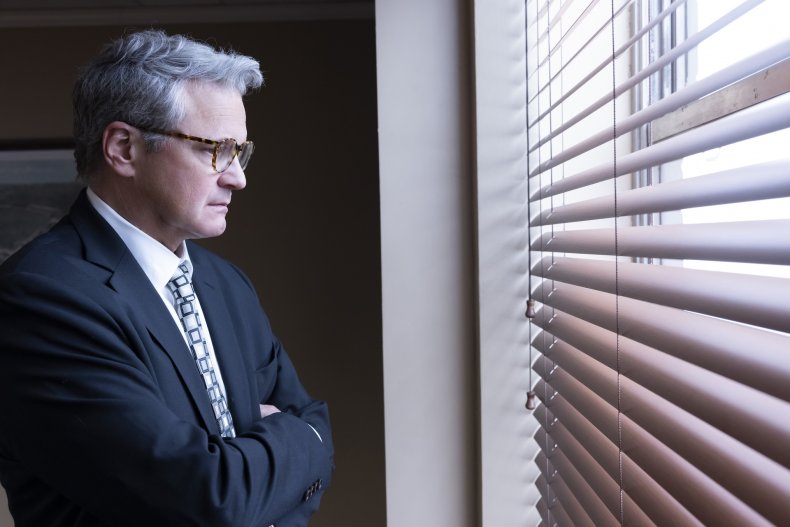
HBO Max
The series takes great inspiration from de Lestrade’s documentary and even includes the director (played by Vincent Vermingon) and his documentary team. Lestrade appears throughout the series, filming Michael in the most mundane and dramatic of moments, capturing his family and his entire trial, appeal, and release.
Inevitably, the series includes elements of fiction, particularly the flashback scenes to Kathleen (Toni Collette) and Michael Peterson’s marriage and the days leading up to her death. It also includes imagined dialogue for dramatic purposes but stays grounded in court documents, meticulous research by the team behind the show, and of course, content from Lestrade’s 13-part documentary.
Additionally, at the beginning of each episode, there is a disclaimer stating the show is “a dramatization based on certain facts.”
However, for Michael Peterson’s lawyer, David Rudolf, HBO Max’s The Staircase fell short at moments surrounding its accuracy, describing moments as “inaccurate,” “misleading” and “outright false”
Newsweek reached out to HBO and director Antonio Campos’s representatives. Both declined to comment directly on Rudolf’s statements.
Speaking to Newsweek, Rudolf raised several concerns he had about the show’s accuracy, including its representation of Lestrade and documentary editor Sophie Brunet, and some small details in the earlier episodes.
He did meet with Michael Stuhlbarg who portrayed him in the series and even lent him his real glasses to wear during the film. However, Rudolf did state he offered to come on board as a “technical consultant” for the series to consult on the courtroom and lawyer scenes but was not contacted by the team behind The Staircase.
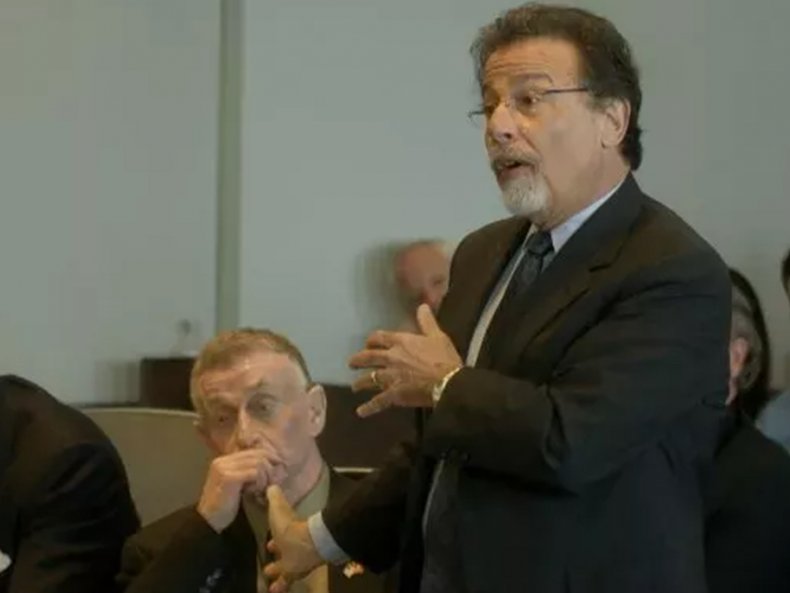
Netflix
The Details
Rudolf first took issue with some of the smaller details in the series. To begin with, he said that the scene where he was introduced to Michael Peterson (played by Colin Firth) in a diner while eating pastrami did not happen in real life. He explained that he first met Peterson at this house in Durham, North Carolina, and holding a meeting in a diner with a client would just never happen,
“There are many things in the first five episodes, which I’ve seen that are inaccurate, misleading, and outright false,” Rudolph told Newsweek.
Additionally, he was unimpressed with some of the early court scenes. For example, when prosecutor Jim Hardin is presenting his case to the grand jury ahead of the trial, Rudolf is seen standing in the same grand jury room, something that he said would never happen in a U.S. courtroom.
He described the scene as “complete fiction” adding that “for anybody who knows anything about the criminal justice system, it totally undermines the credibility of the entire film.”
The Lawyer Fees
Rudolf pointed out how in one scene, Peterson’s brother is seen selling the Peterson family belongings in order to pay for his appeal, an “offensive” detail Rudolph wants to correct.
“They have a scene where Michael’s brother is on the phone with me, telling me that he’s selling all the furniture, to pay to write me checks for the appeal. We didn’t get paid anything for the appeal. We charge Michael a fee for the trial. He paid that, or his brother paid it and that was it. We never charge him another cent and the appeal was done on a court-appointed basis.”
He continued: “In other words, by that point, Michael didn’t have any assets and the court appointed us to represent him on appeal and paid U.S. court-appointed rates. And then when the appeal was over, for the next, whatever, eight years, I represent them for free, and never charge them a penny, I paid my own expenses.
“So to create the impression that somehow I’m this greedy lawyer, who’s forcing my client to sell his furniture in order to write me checks to do his appeal—I mean that is sort of offensive to me. Aside, from being untrue, it’s completely offensive.”
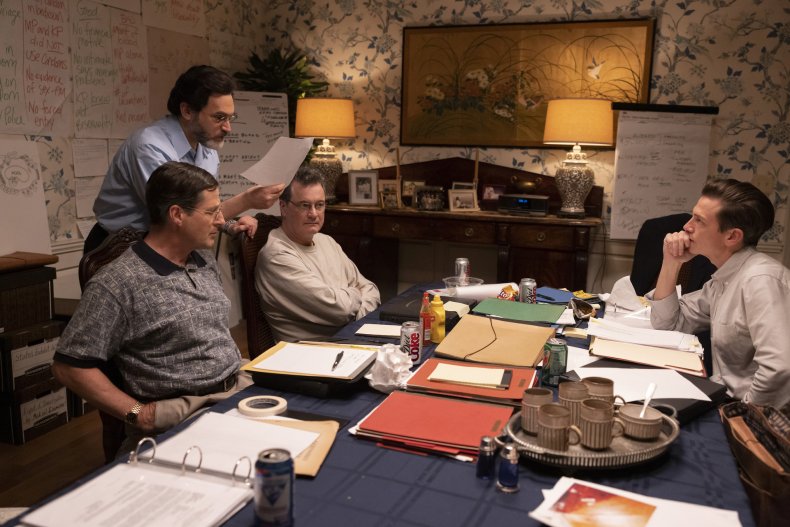
HBO Max
Sophie Brunet and Jean-Xavier de Lestrade
Viewers new to The Staircase story may have been surprised to learn Peterson dated Sophie Brunet, the editor of Lestrade’s first documentary.
In HBO Max’s The Staircase, Brunet (played by Juliette Binoche) appears throughout the series, at first working to edit the documentary film released in 2004 and later as Peterson’s romantic partner. It is true that Peterson and Brunet did date, with Peterson confirming to The News and Observer they went their separate ways in 2017.
“We made plans to live in Paris. Then I went and realized, no, I can’t. I can’t live in Paris. I don’t speak French. I’m too old. I couldn’t afford to live in Paris and my children, and grandchildren were in America,” he said.
“It was a great blow to both of us, for which I feel not guilt, but sorrow,” he continued. “I could not give her what she really needed and deserved, and that would be a full-time partner living with her in Paris. And she said to me, ‘So you’re going to be content just being an old grandfather?’ But I didn’t say to her, ‘You know, yeah, that works fine for me.'”
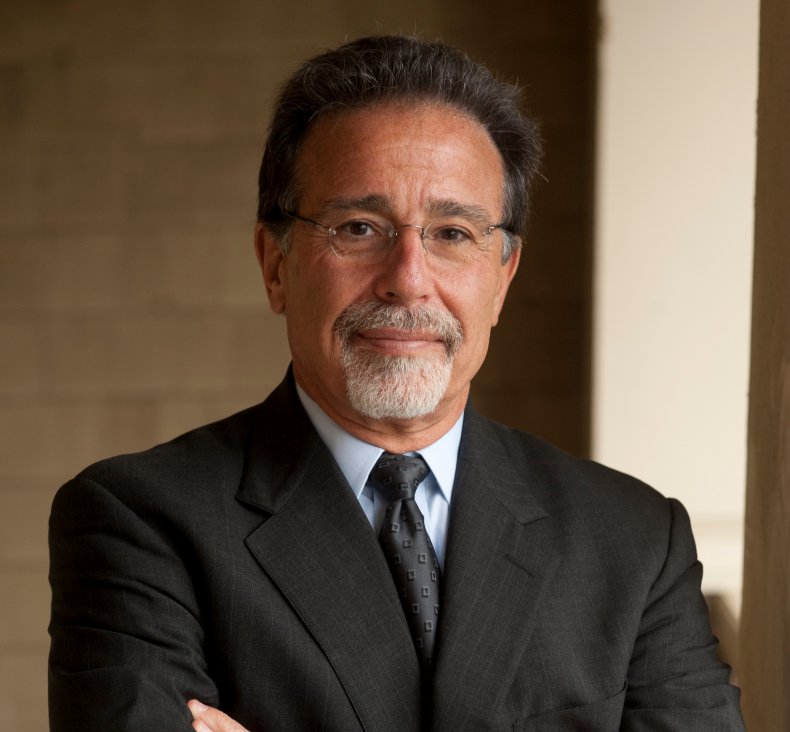
David Rudolf
However, Rudolf and the real Lestrade have both taken issue with how Peterson’s romance with Brunet has been portrayed, believing some scenes implied her relationship with Peterson impacted her neutrality whilst editing the documentary.
In the fifth episode, Brunet and Lestrade are seen arguing with their producer over which clip to delete from the documentary. They argued to keep the clip showing Peterson interacting with his son, Clayton Peterson (Dane DeHaan), whereas their producer wanted to include a scene that covered evidence presented at Peterson’s trial that Kathleen Peterson may have been strangled.
In the end, Lestrade and Brunet won and the scene with Clayton Peterson was included in the documentary instead. It is unknown if their disagreement happened in real life. Regardless, Rudolf believes the damage has been done, describing it as “defamation” towards Brunet and de Lestrade.
“The worst of it, at least so far, is in Episode Five, when they paint a picture of Jean-Xavier, the director, and Sophie, conspiring to cut out a certain scene in order to make the documentary more favorable to Michael. To quote, ‘help him’ on his appeal. That is f***ing defamation because Sophie was off the project,” Rudolf said.
“First of all, Sophie didn’t edit any of the courtroom scenes. She edited the scenes of us in the house, you know, meeting with experts, that sort of thing,” he continued. “Once the trial started, they hired [film editor] Scott Stevenson to edit the trial footage. Sophie remained the editor for several months on the out-of-court stuff. Scott Stevenson was the editor on the in-court stuff, she had nothing to do with it. That’s number one.
“Number two, she left the project in October of 2003. Right about the time the trial ended, they didn’t start putting the cuts together,” Rudolph explained. “For another year, she was gone. Period. Three, she never wrote to Michael while she was working on the project, never ever, ever. It was after she left the project that she first sent him a letter. So you know, the bottom line of all of that, is it creates this impression that this Academy Award-winning director, a documentarian was twisting his film for a completely unethical purpose to help the subject.
“I don’t know that you could possibly make a more serious and damaging claim against a documentarian than that, especially when it’s completely and utterly false and demonstrably false. So you know, I’m sorry that I have to say this, but I think Antonio Campos [The Staircase on HBO Max director] went way beyond what was ethical for him as a filmmaker to do just in order to either sell this film, or to pump its ratings, and that in my judgment is despicable. And you can quote me on that.”
Speaking separately to Vanity Fair about the scenes in the fifth episode of HBO Max’s The Staircase, Lestrade said: “We gave [Campos] all the access he wanted, and I really trusted the man. So that’s why today I’m very uncomfortable because I feel that I’ve been betrayed in a way.”
Brunet also stressed in the same article that her relationship with Peterson began later than depicted in the series and that her editorial decisions were not affected.
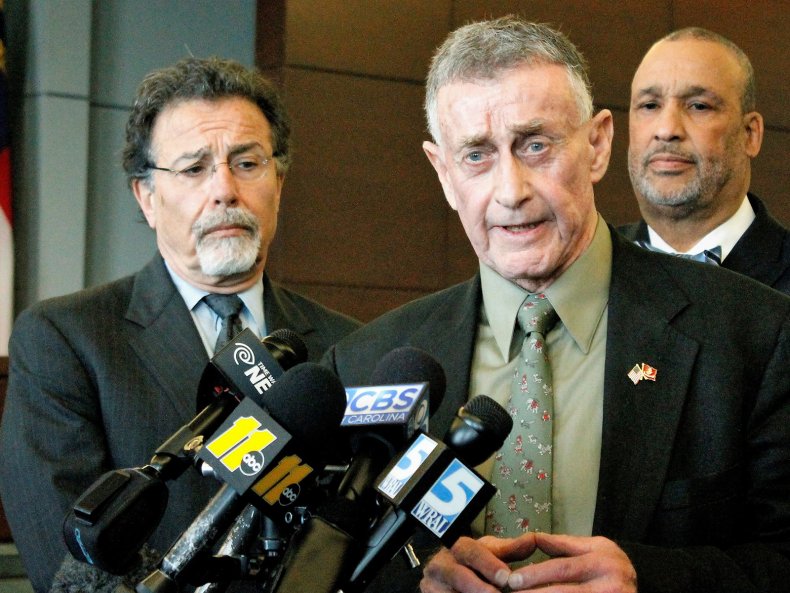
Skip Foreman/AP
Elizabeth Ratliff
On November 25, 1985, Elizbeth Ratliff was found dead at the bottom of her staircase in an eerily similar way to the way Kathleen Peterson was found on December 9, 2001.
Elizabeth Ratliff and her husband, George Ratliff, were close friends of Peterson and his first wife, Patricia Peterson, when they lived in Germany in the 1980s.
The similarities between the deaths of Elizabeth Ratliff and Kathleen Peterson raised eyebrows among the Durham authorities. So much so, that the court in Durham ordered the exhumation of Ratliff’s body from her grave in Texas.
Like Peterson, Ratliff was found at the bottom of her stairs with injuries to her head. At the time, her death was investigated by the U.S. military police in Germany and an autopsy concluded she had died from an intracerebral hemorrhage.
In April 2003, a second autopsy was carried out by a Durham medical examiner, who concluded Ratliff’s cause of death was “homicide.” The medical examiner found Kathleen Peterson and Elizabeth Ratcliffe suffered similar blows to the head, including seven lacerations which were sustained by blunt force trauma.
From Rudolf’s perspective, in HBO Max’s The Staircase, it is implied Rudolf found out about Ratliff only a few weeks before the trial. However, in reality, Rudolf stated he traveled to Germany to investigate what happened to Ratliff and knew about her death a year and a half before the trial.
He said: “I went to Germany, I investigated that whole thing. I talked to the witnesses, I got the German police report and the DA’s file. I spoke with a German investigator. It’s all in the documentary, it’s there. But yet, they [in The Staircase on HBO Max] somehow create the impression that Michael was hiding this from me until four weeks before the trial. Why? You know, I mean, all you have to do is watch the documentary to know that that’s not true. So why would you? Why would you do that just to sort of create a negative impression about Michael Peterson?”
With The Staircase’s true-crime drama available to watch on HBO Max now and the original The Staircase documentary streaming on Netflix, it is ultimately up to viewers to form their own opinion on what they believe happened on the evening Kathleen Peterson died.
The Staircase is streaming on HBO Max now.
[ad_2]
Source link
